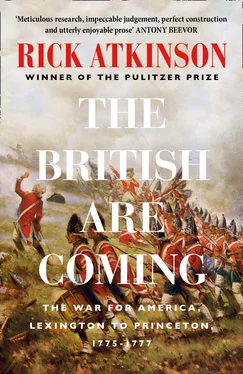Germain believed that hard work could heal most ills, and he threw himself into his new role with vigor: issuing commands, rifling through official papers, scratching missives in his jagged, runic hand, the precise time always affixed on his letters to the king. He had long argued that “natural sloth” impeded British administration, especially in the thicket of bureaucracies and office fiefdoms now entangled with centuries of inertia and bad habits. Good habits could help revive efficiency. An admirer described Germain’s executive style as “rapid, yet clear and accurate.… There was no obscurity and ambiguity in his compositions.” His task would be herculean—to direct the longest, largest expeditionary war Britain had ever fought, concocting an effective counterinsurgency strategy while coordinating troops, shipping, naval escorts, and provisions. The small details alone were bewildering. Might the army in Boston want several dozen Tower wall-pieces that could throw a two-ounce ball five hundred yards with precision? When should six thousand new muskets be shipped to Quebec and Virginia? By what means? Were the lower decks in leased Dutch transport ships properly scuttled to avoid suffocating the horses headed across the Atlantic?
Upon arriving at Whitehall in mid-November, Germain found only bad news from America. Several dozen letters from royal governors in the southern colonies showed that the Crown’s efforts to punish Massachusetts had transformed New England grievances into continental resentments. The southern governors believed themselves vulnerable to rude treatment if not assassination, and most had abandoned their capitals for the sanctuary of British warships. “A motley mob … inflamed with liquor” had chased Governor Josiah Martin from his palace in North Carolina. In South Carolina, where rebels had amassed “great quantities of warlike stores,” Governor William Campbell wrote from the man-of-war Cherokee , “I fear it is forgot that His Majesty has any dominions in this part of America.” Official dispatches and other royal mail had been stolen in Florida. Virginia’s governor, Lord Dunmore, had fled from Williamsburg. “My clerk,” he wrote, “is prisoner.” Governor James Wright in Georgia seemed especially rattled. “Liberty gentlemen” had pilfered six tons of his gunpowder and snatched his mail. “I begin to think a King’s governor has little or no business here,” he reported. Rebels in Savannah, he added, included “a parcel of the lowest people, chiefly carpenters, shoemakers, blacksmiths, etc., with a Jew at their head.” Wright’s dispatches grew increasingly frantic. “No troops, no money, no orders or instructions, and a wild multitude gathering fast,” he added. “What can a man do in such a situation?”
Reports from the northern colonies were just as disheartening. A naval captain in Rhode Island wrote of “rebels coming in shoals, armed with muskets, bayonets, sticks and stones,” yelling, “Kill the Tories!” Only a Royal Navy threat to put every insurgent to the sword had restored calm. A Connecticut clergyman warned that malice “against the loyalists is so great and implacable that we fear a general massacre.” Governor John Wentworth had retreated to Boston after a mob demolished his New Hampshire house. In New York, Governor William Tryon had been chased to the Duchess of Gordon in the East River, and the loyal president of King’s College had fled all the way to England. When regulars also boarded ships for safety, rebels ransacked their baggage, looted an ordnance magazine, and made off with shore guns from the batteries in lower Manhattan. “The Americans,” Tryon warned, “from politicians are now becoming soldiers.”
Germain found broad agreement in the government on Britain’s strategic objective—to restore the rebellious colonies to their previous imperial subservience—but disagreement on how best to achieve that goal. How to defeat an enemy that lacked a conventional center of gravity, like a capital city, and relied on armed civilians who were said to be “deep into principles”? Should British forces hunt down and destroy rebel forces in the thirteen colonies and Canada? Strangle the colonies with a naval blockade? Divide and conquer by isolating either New England or the southern colonies? Hold New York City while subduing the affluent middle colonies between Virginia and New Jersey?
Lord North and some others in the cabinet now inclined toward a land rather than a naval war in hopes that it would be quicker, cheaper, and less provocative to the French. Such a strategy would also give greater succor to American loyalists, whom most British officials, Germain among them, still believed constituted a colonial majority. Yet doubts persisted. “The Americans may be reduced by the fleet,” Secretary at War Barrington had written North, “but never can be by the army.” A War Office report warned that fewer than ten thousand regulars in the British Isles could be spared for overseas duty. Given the booming economy, no more than six thousand more were likely to be recruited in time for the 1776 campaign. “Unless it rains men in red coats,” a British official wrote, “I know not where we are to get all we shall want.” Seventeen recruiting parties in Ireland were enlisting only one or two dozen men per week, combined. “This will never do,” wrote General Harvey, the adjutant general. “We are dribletting away the army, & to no purpose.”
Germain soon encountered other aggravations. Army recruiters competed with the Royal Navy and the East India Company for men. A dozen departments administered the army and overseas military logistics, with fitful coordination, when not outright rivalry, among them. Shipwrights resisting new efficiency rules had gone on strike, bringing Portsmouth and most other yards to a standstill; almost 130 were fired, hampering ship construction and repair. Too often the king and his men were forced to make crucial decisions in the dark, or at least the dusk. Voyages from England to America usually took ten weeks, though sometimes fifteen or more; return trips with the prevailing winds typically required six weeks. A minister might wait four months for acknowledgment that his instructions had been received, or he might wait forever: forty packet boats carrying the Royal Mail would be captured or founder in storms during the war. Misunderstanding, misinformation, and untimely orders were inevitable, particularly when London relied on such flawed sources of intelligence as loyalists desperate for Crown support and royal governors banished from their own capitals. “America,” General Harvey said, “is an ugly job.”
Like the man he called “the mildest and best of kings,” Germain often invoked the need for “zeal.” Sensing that the Americans had advantages of time and space, he vowed to bring “the utmost force of this kingdom to finish the rebellion in one campaign” before other European powers could intervene to aid the rebels. If the insurrection was to be crushed in 1776, half measures would never do.
Zeal could be found in the Prohibitory Act, introduced in the Commons by North on November 20. All vessels found trading with the Americans “shall be forfeited to His Majesty, as if the same were the ships and effects of open enemies.” Cargoes taken on the high seas would be considered lawful seizures. Captured American mariners could be pressed into the Royal Navy. American ports were to be blockaded. The act amounted to “a declaration of perpetual war,” one British politician observed, although John Adams would call it an “act of independency” that galvanized American resistance. Parliament overwhelmingly approved the measure, and the king gave his assent on December 22. The king also had approved the Admiralty’s plan to recall Admiral Graves in hopes that his replacement, Vice Admiral Molyneux Shuldham, a former governor of Newfoundland, would put a spark into the North American squadron.
Читать дальше












